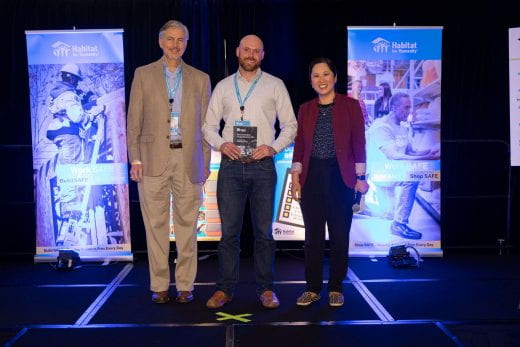
The Manhattan Area Habitat for Humanity was recently presented the Simpson Strong-Tie Best in Innovative Design Solutions award in the Habitat House Design Contest, at the Habitat for Humanity International Conference. Josh Brewer, a graduate student in the Kansas State University Leadership Communication doctoral program and the executive director for the Manhattan Area Habitat for Humanity, accepted the award on behalf of the Manhattan Area Habitat for Humanity.
The award recognizes a collaborative build completed with the following partners: Net Positive Studio, a program in the Kansas State University College of Architecture, Planning, and Design directed by Michael Gibson, assistant professor; Manhattan Area Technical College (MATC); Flint Hills Job Corps; Flint Hills Renewable Energy and Efficiency Cooperative (FHREEC); and Fort Riley Home Builders Institute (HBI).
Brewer’s professional experience and his leadership development in the doctoral program enable him to recognize the value in community collaboration and practicing leadership when approaching problem-solving.
“In the Leadership Communication program, we learn how to affect change through the practice of leadership, and collaboration is vital to that practice. By listening and learning from one another, this coalition discovered innovative ways of building safer, more durable and more affordable houses through improved housing design and construction,” said Brewer.
The collaborators came together to provide a new way of approaching the workforce housing challenge. They designed and built an innovative prototype home that created financial stability through homeownership.
The prototype home was pre-fabricated by K-State students in the spring of 2021 using high-performance building materials, resulting in a more energy-efficient building envelope that was faster to build than traditional framing. Students from the MATC Construction Technology program and Fort Riley HBI carpentry class led construction efforts with interior and exterior framing and finish. Later, the Flint Hills Renewable Energy and Efficiency Cooperative hosted a community “sun raising” event to demonstrate solar panel installation. The home construction was completed in December of 2021 and purchased by a community member who has lowered her monthly cost-of-home and, as a result, is now able to build equity in her home.
As a land grant institution, K-State is committed to outreach and engagement initiatives and partnerships with various stakeholders to create, share and apply knowledge into applications that address public needs. Community engagement is a major cornerstone of K-State’s Leadership Communication Ph.D. program approach to building people’s capacity to lead change.
“Habitat for Humanity is committed to empowerment and community change through housing sector interventions and if we’re serious about finding new ways of approaching big and messy challenges like workforce housing in the Flint Hills, it’s vital that we partner with established community institutions like K-State, MATC, Job Corps, Fort Riley, and FHREEC,” said Brewer.
To get involved with the Manhattan Area Habitat for Humanity, visit their website at www.MAHFH.org. To learn more about the K-State leadership communication doctoral program, visit www.k-state.edu/leadership.
